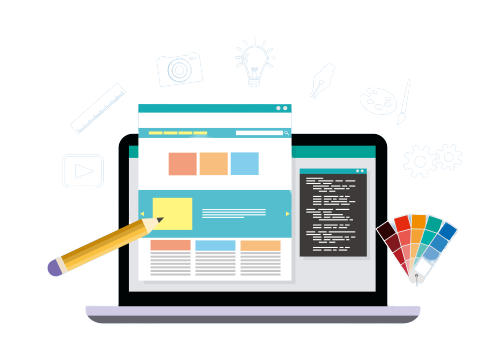The Future Of A Learning Management System: Benefits of Using It.
The future of a learning management system cannot be overemphasized. It is a technology that you must embrace as a seasoned coach or as an organization. But before we continue, what is a learning management system?
A Learning Management System (LMS) is a software platform designed to manage, deliver, and track educational and training content. LMSs are used by educational institutions, corporations, and organizations to provide online learning experiences, as well as to manage and track learners' progress and performance.
A Learning Management System typically provides features such as course creation and management, content delivery, student tracking and reporting, assessment and grading, collaboration tools, and communication tools. It allows educators to create and deliver a variety of online learning materials, including text-based content, videos, audio recordings, and interactive simulations.
LMSs have become increasingly popular in recent years due to the growing demand for online learning and the need to efficiently manage educational and training content. They are used in a wide range of industries, including healthcare, finance, government, and technology, to provide employees with training and development opportunities.
Overall, an LMS provides a centralized platform for managing and delivering educational and training content, which can help organizations improve learning outcomes and better manage their training programs.
The Future of Learning Management Systems: Emerging Trends and Technologies.
Learning Management Systems (LMS) have been essential for educational institutions, businesses, and organisations for several years. As technology advances and the demand for remote learning increases, the future of LMS is evolving rapidly. Emerging trends and technologies are shaping the future of LMS, and here are some of the most significant ones:
1. Personalization:
Personalized learning experiences are gaining popularity as learners seek more customized and targeted content. LMSs are integrating AI and machine learning algorithms to analyze learner behaviour and provide personalized recommendations.
The rise of adaptive learning technologies and artificial intelligence enables LMS to offer personalized learning experiences based on each student's needs and preferences. This trend is expected to continue, as LMS become more sophisticated in tracking and analyzing student performance data.
2. Microlearning:
Short, bite-sized learning modules are becoming increasingly popular, catering to learners' attention spans and busy schedules. LMSs are integrating microlearning features to deliver more flexible and engaging content.
3. Mobile Learning:
With the rise of mobile devices, learners expect to access learning content anytime, anywhere. LMSs are adopting responsive design and mobile-first approaches to provide seamless learning experiences across different devices.
As more students and learners access content from mobile devices, LMS is adapting to provide a mobile-friendly learning experience. This trend is likely to continue as mobile devices become more ubiquitous and accessible.
4. Gamification:
Gamification techniques, such as badges, leaderboards, and reward systems, are being incorporated into LMSs to make learning more engaging and interactive.
5. Social Learning:
6. Virtual Reality (VR) and Augmented Reality (AR):
Immersive technologies such as VR and AR are being integrated into LMSs to provide realistic and interactive learning experiences.
7. Analytics:
LMSs are integrating more advanced analytics and reporting features to provide insights into learner behaviour, course performance, and ROI.
8. Artificial Intelligence and Machine Learning:
Artificial intelligence and machine learning are being used to automate certain aspects of the learning process, such as content curation and assessment grading. This trend is expected to continue as LMS become more intelligent and automated.
Overall, the future of LMS is expected to be shaped by emerging technologies that offer more personalized, engaging, and efficient learning experiences. As the demand for online learning continues to grow, LMS will need to adapt and evolve to meet the changing needs of learners and educators.
Benefits of Using a Learning Management System
When compared to classroom learning, e-learning is estimated to save up to 45% of your organization's time. This is due to the fact that each of your learners can complete their training at their own pace and at different times.
Then you can account for the time it currently takes your employees to travel to and from your classroom, training facility, or headquarters. When applied across your entire workforce, even a 40-minute round-trip adds up to a significant amount of time spent away from regular duties.
1. Flexibility:
LMSs allow learners to access content from anywhere, at any time, making it easier to fit learning into busy schedules.
2. Saves money:
One of the most underappreciated advantages of using a Learning Management System is that it saves users a significant amount of time and money.
With so many fancy features to consider, it's easy to overlook the fact that, at its most basic, an LMS allows students to share a wide range of study materials and resources for free while also keeping them boundaryless. These resources would otherwise consume a significant portion of a student's already limited budget.
3. It saves time:
Aside from that, hybrid learning allows students to save money on travel and commute time by taking classes from the comfort of their own homes. An LMS also enables institutions to save money by reducing the number of physical classes on campus, especially for smaller groups of students, to better use order to make better use of campus resources.
Learning Management Systems can be more cost-effective than traditional classroom-based training, as they eliminate the need for travel, accommodation, and other associated costs
4. An LMS reduces employee turnover.
The cost of an LMS is one thing; the cost of recruiting is quite another. Replacing employees on a regular basis is a large business. Everything we've discussed so far - consistent, flexible training; learning that fits neatly alongside regular work; interactive, engaging training; targeted interventions to assist your staff; and better succession planning - is likely to increase employee satisfaction and retention.
5. You can easily incorporate quizzes, scenario scenarios, and other interactive elements into your training with an LMS.
A vibrant learning ecosystem also includes gamification, messaging, and forums. This, combined with a strong and intuitive UX interphase, makes training more appealing and effective for learners.
6. Consistency:
A Learning Management System provides a consistent learning experience, ensuring that all learners receive the same quality of education, regardless of their location or time zone.
7. Customization:
LMSs allow educators to create and deliver customized content that meets the unique needs of learners, resulting in more effective learning outcomes.
8. Tracking and Reporting:
LMSs provide detailed tracking and reporting features, allowing educators and administrators to monitor learners' progress and performance and identify areas for improvement.
9. Scalability:
LMSs can be scaled to meet the needs of large organizations or educational institutions, making it easier to manage and deliver learning content to a large number of learners.
10. Interactivity:
LMSs can provide interactive learning experiences, such as gamification techniques and multimedia content, making learning more engaging and enjoyable for learners.
11. Accessibility:
LMSs can be made accessible to learners with disabilities, ensuring that everyone has equal access to education and training.
In conclusion, LMSs provide many advantages for learners, educators, and organizations, including flexibility, cost-effectiveness, customization, tracking and reporting, scalability, interactivity, and accessibility. These benefits have contributed to the widespread adoption of LMSs in various industries and educational settings.
Let's talk about the advantages of a Learning Management System for you and your company.
If you'd like to learn more about how an LMS could benefit you and your company, or you want to order a free DEMO please send us a message or call 07080009967.
To get started for FREE visit our website www.tribearc.com











